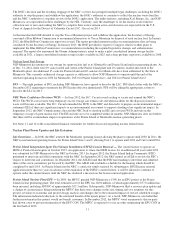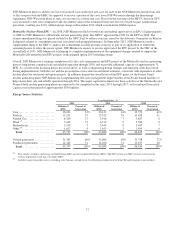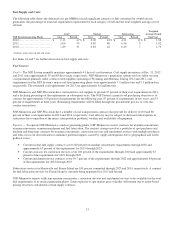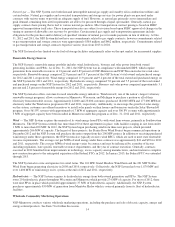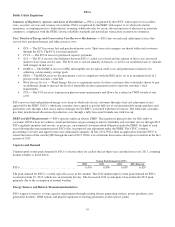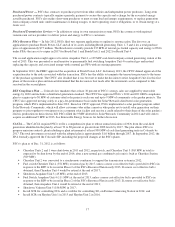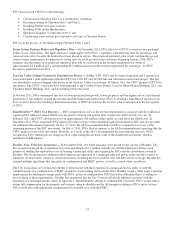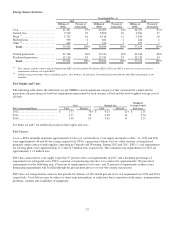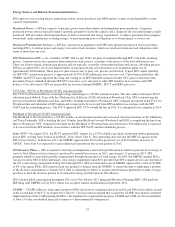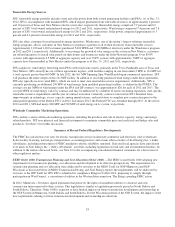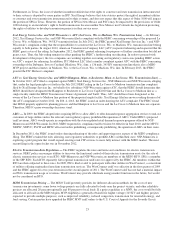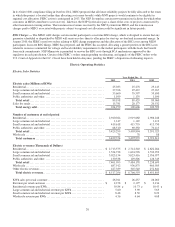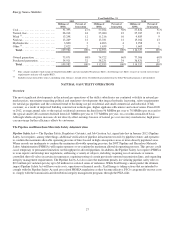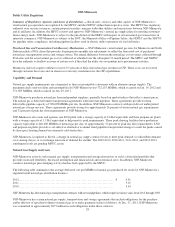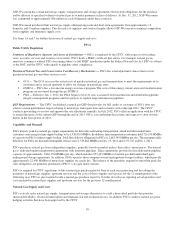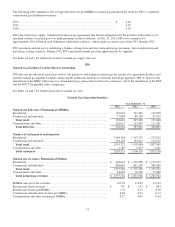Xcel Energy 2012 Annual Report Download - page 31
Download and view the complete annual report
Please find page 31 of the 2012 Xcel Energy annual report below. You can navigate through the pages in the report by either clicking on the pages listed below, or by using the keyword search tool below to find specific information within the annual report.
21
SPS
Public Utility Regulation
Summary of Regulatory Agencies and Areas of Jurisdiction — The PUCT and NMPRC regulate SPS’ retail electric operations and
have jurisdiction over its retail rates and services and the construction of transmission or generation in their respective states. The
municipalities in which SPS operates in Texas have original jurisdiction over SPS’ rates in those communities. Each municipality can
deny SPS’ rate increases. SPS can then appeal municipal rate decisions to the PUCT, which hears all municipal rate denials in one
hearing. The NMPRC also has jurisdiction over the issuance of securities. SPS is regulated by the FERC with respect to its wholesale
electric operations, accounting practices, wholesale sales for resale, the transmission of electricity in interstate commerce, compliance
with NERC electric reliability standards, asset transactions and mergers, and natural gas transactions in interstate commerce. SPS has
received authorization from the FERC to make wholesale electric sales at market-based prices.
Fuel, Purchased Energy and Conservation Cost-Recovery Mechanisms — SPS has several retail adjustment clauses that
recover fuel, purchased energy and other resource costs:
• DCRF — The DCRF rider recovers distribution costs in Texas.
• DRC — The DRC rider recovers deferred costs associated with renewable energy programs in New Mexico. The current
rider is in effect through June 2013.
• EECRF — The EECRF rider recovers costs associated with providing energy efficiency programs in Texas.
• EE rider — The EE rider recovers costs associated with providing energy efficiency programs in New Mexico.
• FPPCAC — The FPPCAC adjusts monthly to recover the difference between the actual fuel and purchased power costs
and the amount included in base rates of SPS’ New Mexico retail jurisdiction.
• PCRF — The PCRF rider allows recovery of certain purchased power costs in Texas.
• TCRF — The TCRF rider recovers transmission infrastructure improvement costs and changes in wholesale transmission
charges in Texas.
The PUCT approved SPS’ request that the recovery of the costs associated with the TCRF and PCRF be included in base rates
effective February 2011. Fuel and purchased energy costs are recovered in Texas through a fixed fuel and purchased energy
recovery factor, which is part of SPS’ retail electric tariff. Based on regulatory approval in 2011, SO2 and NOx allowance
revenues and costs are also recovered through the fixed fuel and purchased energy recovery factor. The regulations allow retail
fuel factors to change up to three times per year.
The fixed fuel and purchased energy recovery factor provides for the over- or under-recovery of fuel and purchased energy
expenses. Regulations also require refunding or surcharging over- or under- recovery amounts, including interest, when they
exceed four percent of the utility’s annual fuel and purchased energy costs on a rolling 12-month basis, if this condition is
expected to continue.
PUCT regulations require periodic examination of SPS’ fuel and purchased energy costs, the efficient use of fuel and purchased
energy, fuel acquisition and management policies and purchased energy commitments. SPS is required to file an application for
the PUCT to retrospectively review fuel and purchased energy costs at least every three years.
NMPRC regulations require SPS to request authority to continue collecting its fuel and purchased power costs through a fuel
adjustment clause every 4 years. The NMPRC has granted SPS authority to use a fuel adjustment clause through November 2014.
SPS recovers fuel and purchased energy costs from its wholesale customers through a monthly wholesale fuel and purchased
economic energy cost adjustment clause accepted for filing by the FERC.
Capacity and Demand
Uninterrupted system peak demand for SPS for each of the last three years and the forecast for 2013, assuming normal weather, is
listed below.
System Peak Demand (in MW)
2010
2011
2012
2013 Forecast
SPS ..............................................
4,985
5,210
5,265
5,193
The peak demand for the SPS system typically occurs in the summer. The 2012 uninterrupted system peak demand for SPS
occurred on Aug. 2, 2012.


